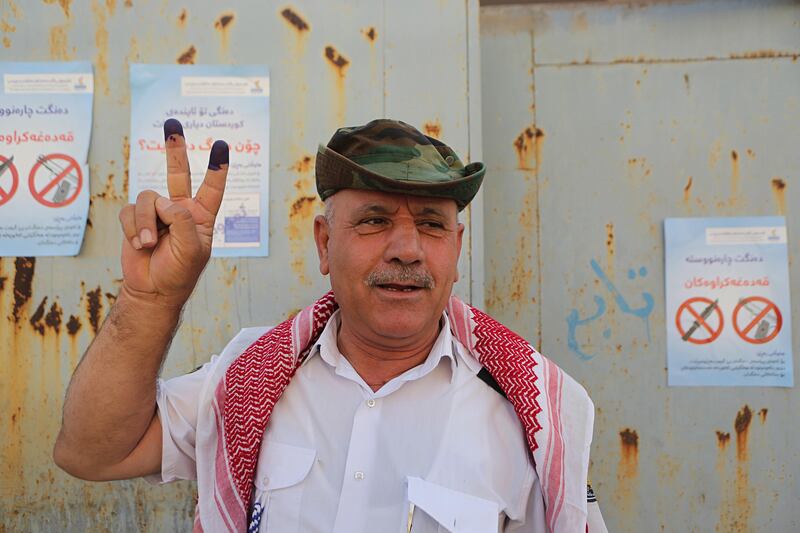The Kurdish capital of Erbil awoke to an unusual silence on Monday morning as businesses and shops stayed shut and residents readied themselves to vote in a historic poll that could bring Iraq’s Kurds closer to their decades-old dream of independence.
At 8am, voters began pouring into polling stations in their finest traditional Kurdish clothing. After casting their votes, men and women showed off their ink-stained index fingers with pride and excitement.
Kurdish nationalism was at its peak, with flags draped everywhere and car windows plastered with images of Iraqi Kurdish president Masoud Barzani visible on most of Erbil’s streets.
Following weeks of intense campaigning in both Iraq's autonomous Kurdish region and territories held by Kurdish forces but contested by both the Kurds and Baghdad, Mr Barzani delivered on his promise to hold the much-anticipated referendum. The decision was taken in spite of a widespread international backlash, including Iran closing its air space to flights from the Kurdish region.
_______________
Read more on the Kurdish referendum:
[ Iraq parliament demands troops be sent to Kirkuk amid voting ]
[ Seven key points ]
[ Referendum excitement hits fever-pitch in some cities - but others are wary ]
Analysis: Vote a smokescreen for Barzani's domestic political woes
_______________
The result of the vote is not legally binding, but Kurdish officials insist it will lead to more fruitful talks with their counterparts in Baghdad. President Barzani declared on Sunday that once the votes were cast, Kurdistan would not return to its “failed partnership” with Baghdad.
In downtown Erbil, a handful of referendum posters could be seen draped over the ancient walls of the newly restored citadel. One showed the Kurdish sun emblem shackled to a red, white and black chain — the colours of the Iraqi flag.
At the foot of the citadel, in one of Erbil’s oldest tea shops, two elderly friends and former fighters with the Kurdish peshmerga forces were waiting to cast their votes for independence.
“There’s no way we will return to Baghdad again,” said Jabar Hassan Sulaimani, a blue-eyed man in his 70s sporting a white moustache and dressed in khaki.
“God willing we will not fight,” he added, alluding to the rising tension between Erbil and Baghdad. Like the majority of Kurdistan’s older generation, Mr Sulaimani witnessed Saddam Hussein’s fierce campaign against Iraq’s rebellious Kurds and wants to break away from the central government.
Baghdad, said Mr Sulaimani, had lied and oppressed the Kurds for too long; only independence could bring security.
In an attempt to undermine the vote, Iraqi prime minister Haider Al Abadi demanded on Sunday that Kurdish authorities relinquish control of the airport in Erbil and border crossings with Iran and Turkey to Baghdad. He also asked other countries stop buying oil from the Kurds.
“We’re a different nationality, a different culture, everything about us is different,” explained Fatah Mohammad, also in his 70s. “We feel we’re being reborn. We’ve shed blood for this [dream] for many years,” said the former peshmerga fighter, sipping on steaming tea.
Across the city, in the wealthy Azadi neighbourhood, an unusually organised queue of families waited to cast their votes in a school named after Mr Barzani’s father, the nationalist leader and Kurdish hero Mustafa Barzani.
Jamila Rahman, 43, was visibly happy as she made her way toward the voting booth with her youngest child. “We couldn’t sleep from the excitement last night,” she admitted, nervously rearranging her black headscarf.
“Independence means more security and more freedom. We want our flag and our country,” she explained.
For Ms Rahman and her fellow Kurds, the day was laden with historical importance, yet it was also a day for celebration and family gatherings. “I’ve cooked celebratory food,” she smiled. Some residents likened the day to Eid celebrations.
North of Azadi, in the Christian neighbourhood of Ainkawa, shop shutters stayed down and windows sported pro-referendum posters.
Bigi Yousef, a slight woman with long white hair, pushed her vote in the ballot box before turning and smiling. “I’m happy to be voting for my country,” said the elderly Christian woman. “With independence it will be more secure and Christians want security.”
But not all Kurds chose to vote.
Ahmed Najm, a 28-year-old journalist in the Iraqi Kurdish city of Sulaymaniyah, said he was disillusioned with the political elite for turning two communities that should support one another against each other — adding that he knew other Kurds who felt the same.
“I don’t want to say yes to independence because I’m really proud of being Iraqi, but I don’t want to say no because it’s other people’s right to decide their future,” he said.





